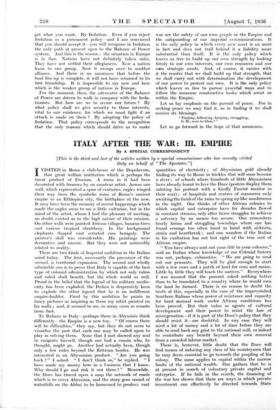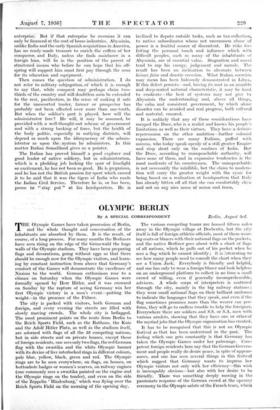ITALY AFTER THE WAR : ILL EMPIRE
By A SPECIAL CORRESPONDENT
[This is the third and last of the articles written by a special commissioner who has recently visited Italy on behalf of "The Spectator."] IVISITED in Rome a club-house of the Dopolavoro, that great welfare institution which is perhaps the finest product of Fascism. A room in it had been decorated with frescoes by an amateur artist. Across one wall, which represented a span of centuries, eagles winged their way from the symbolic ruins of Rome's ancient empire to an Ethiopian city, the birthplace of the new. It may have been the memory of recent happenings which made the eagles seem to me a little vulturine, but in the mind of the artist, whom I had the pleasure of meeting, no doubt existed as to the high nature of their mission. On other walls were painted African villages, banana-trees and various tropical shrubbery. In the background elephants flapped vast serrated ears benignly. The painter's skill was considerable. His paintings were decorative and sincere. But they were not noticeably related to reality.
There arc two kinds of Imperial ambition in the Italian mind today. The first, necessarily the precursor of the second, is territorial expansion. The second and wholly admirable one is to prove that Italy is capable of the best type of colonial administration by which not only rulers and ruled shall benefit, but the whole world as well. Proud in the belief that the legend of his military medio- crity has been exploded, the Italian is desperately keen' to explode the other legend that he is an indifferent empire-builder. Fired by this ambition he paints in fancy pictures as inspiring as those my artist painted on his walls ; and, it seemed to me, in many cases as remote from fact.
To Italians in Italy—perhaps those in Abyssinia think differently—the Empire is a new toy. " Of course there will be difficulties," they say, but they do not seem to visualise the part that each one may be called upon to play in solving them. None that I met showed any zeal to emigrate himself, though one had a cousin who, he thought, might go. Another had actually been, though only a few miles beyond the Eritrean border. He was interested in an Abyssinian product. " Are you going back ? " I asked. " I don't think so," he replied. " I have made my money here in a business that I know Why should I go and risk it. out there ? " . Meanwhile, the Duce has traced upon a map the network of roads which is to cover Abyssinia, and the story goes round, of waterfalls on the Abbai to be harnessed to produce vast quantities of electricity ; of Abyssinian gold already finding its way to Rome in trickles that will soon become a river ; of schools where hundreds of little Abyssinians have already learnt to love the Duce (posters display them saluting his portrait with a kindly Fascist mentor in their rear) ; of hospitals and centres of commerce only awaiting the finish of the rains to spring up like mushrooms in the night. One thinks of other African colonies to which capital and enterprise have for decades flowed in constant streams, only after fierce struggles to achieve a solvency by no means too secure. One remembers lonely farms and struggling townships .where one .latia found courage too often hand in hand with sickness, strain and heartbreak ; and one wonders if the Italian in his exaltation has not lost sight of the true cost of African empire. " You have always sent out your elite to your colonies," said an Italian whose knowledge of our Colonial history was not, perhaps, exhaustive. " We are going to send out our peasants. They will be glad enough to start with a few cows and a patch of land for corn and maize. Little by little they will teach the natives." Everywhere I was assured that the peasant asked nothing better than to be translated to a country where he would own the land he farmed. There is no reason to doubt the truth of this, especially in the case of the impoverished Southern Italians whose power of resistance and capacity for hard manual work under African conditions has been proved.' But their value as' agents of cultural development and their power to resist the lure of miscegenation—if it is part of the Duce's policy that they should resist it 'are doubtful. In any case they will need a .lot of money and a lot of time before they are able to send back any grist to the national mill, or indeed to contribute any benefit beyond their own removal from a crowded labour-market.
There is, however, little doubt that the Duce will find means of inducing any class of his countrymen that he may deem essential to go towards the peopling of his colony. The same applies to capital within the narrow limits of the national wealth. One gathers that he, is at present in search of voluntary private capital and enterprise. If he fails in the search, the financing of the war has shown that there are ways in which private investment. can effectively be directed towards State . . enterprise. But if that enterprise be overseas it can only be financed at the cost of home industries. Abyssinia, Unlike India and the early Spanish acquisitions in America, has no ready-made treasure to enrich the coffers of her conqueror, and Italy, unless she finds assistance in a foreigin ician, will be in the position of the parent of straitened Means who before he can hope that his off- spring Will' support him must first pay through the nose for its education and equipment.
Then comes the question of administration. ' I do not refer to military subjugation, of which it is enough to say that, While conquest may perhaps claim two- thirds of the country and will doubtless soon be extended to the rest, pacification, in the sense of making it safe for the unescorted trader,' -farmer or prospector has probably 'not' been effected over more than one-tenth. But when the soldier's part is played, how will the administrator fare ? He 'will, it may be assumed, be provided with a well-thought-out scheme of government and with a strong backing of force, but the health of the body politic, especially in outlying districts, will depend as much upon the idiosyncrasy of the admin- istrator as upon the f: system• he administers. In this matter Italian Somaliland gives us a pointer.
The Italian has proved himself a good explorer and good leader- of native soldiery; but in administration, which is a plodding job lacking the spur of • limelight or: excitement, he has not been so good.. He is gregarious, and be has not.the British passion.for sport which caused it to, be said that it was the tigers of India who made the Indian. Civil. Service. Therefore lie is, or. has been, prone. to ”. stay put " at his headquarters. He is inclined to depute outside tasks, such as tax-collection; to native subordinates whose not uncommon abuse of power is a fruitful source of discontent. He risks for- feiting the personal touch and influence which with difficult peoples, such as many of the inhabitants of Abyssinia, are of essential value. Stagnation and ennui tend to sap his energy, judgement and morale. The result has been an inclination to alternate betweeh laissez faire and drastic coercion. What Italian coercion may mean has been hideously demonstrated in Libya. If this defect persists—and, having its root in an amiable and deep-seated national characteristic, it may be hard to eradicate—the best of systems may not give to Abyssinia the understanding and, above all things, the calm and consistent government, by which alone disorder can be avoided and real progress, both' cultural and material, ensured.
It is unlikely that any of these considerations haVe escaped the Duce, who is a realist and knows his people's limitations as well as their virtues. They have a definite repercussion on the other ambition—further colonial expansion. There are many Italians, puffed with success, who today speak openly of a still greater Empire and stop short only on the confines of India. But the Duce, according to unimpeachable authority, will have none of them, and in expansive tendencies is the Most moderate of his countrymen. The unimpeachable is not necessarily the infallible, but the claim to modera- tion will carry the greater weight with the cynic for being based on a realisation at headquarters‘ that Italy has already bitten off all that she can comfortably chew and not on any nice sense of meum and tuum,.







































 Previous page
Previous page